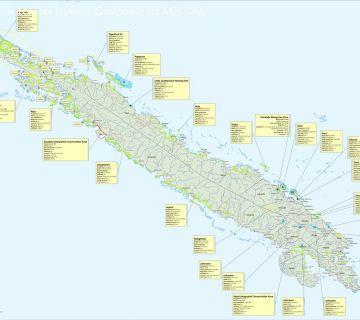
Isabel
Western Kolombangara
Temotu
Makira
Malaita South
Central Islands
Western Tetepare
Western Marovo
Western West
Rennel
Solomon Islands (All)
Western Shortlands
Choiseul
Malaita North
Western Munda
Guadalcanal
SEPTEMBER 6, 2019 BY LEANNEM
General News
6 September 2019, Apia, Samoa – Environment Ministers from around the Pacific region met today in Apia, Samoa at the conclusion of the Secretariat of the Pacific Regional Environment (SPREP)’s 29th Meeting of Officials, to identify key priorities in relation to some of the most
… Read MoreSEPTEMBER 4, 2019 BY ANGELICAS
Waste Management and Pollution Control
4 September, 2019, Apia, Samoa – Unmanaged disaster waste can negatively impact the recovery efforts of countries affected by natural hazards. This was the key message expressed at a special side event held last night, where the draft Regional Disaster Waste Management
… Read More SEPTEMBER 2, 2019 BY ANGELICAS
Island and Ocean Ecosystems
The 18th meeting of the Conference of the Parties to the Convention on International Trade in Endangered Species of Wild Fauna and Flora (CITES CoP18) convened in Geneva, Switzerland following the cancellation of the meeting in May in Sri Lanka in
… Read MoreAUGUST 20, 2019 BY LEANNEM
Environmental Monitoring and Governance
19 August 2019, Apia, Samoa - The regional Inform project is holding a meeting this week to review progress towards building national and regional capacity to improve environmental decision-making through strengthening planning and reporting in the Pacific.
Read MoreTo provide an enabling environment for the socio-economic development of the Solomon Islands through the application of necessary safeguards with regard to sustainable use of natural resources, the provision of meteorological services, reducing the risk and impact of climate change and other hazards to communities and leading and managing disaster preparedness and their consequences.
The Ministry of Environment Climate Change and Disaster Management and Meteorology is made up of 4 Divisions and 1 Office. They are the:
The Ministry of Environment, Climate Change, Disaster Management and Meteorology (MECDM) is responsible for sustainable environmental management, climate change adaptation and mitigation, disaster risk management and meteorological services for the Solomon Islands. The Ministry is organised into four technical divisions that look after each of the technical areas, namely environment and conservation, climate change, disaster management, meteorology. There is a separate division that is responsible for corporate services.
“A safe, sustainable and resilient environment for Solomon Islands”
“To provide an enabling environment for the socio-economic development of the Solomon Islands through the application of necessary safeguards with regard to:
The MECDM is relatively new (amalgamated in 2007 and expanded in 2010). Its key mandates are to promote and ensure safe, sustainable and resilient Solomon Islands communities and to coordinate and guide the sustainable use and conservation of the Solomon Islands’ natural resources and ecosystems, as well as providing key data services such as meteorological information and disaster risk reduction and management strategies.
These mandates are derived from both Cabinet decisions and legislation. As one senior staff of the Ministry put it, the MECDM’s mandate is distilled to that of a “safeguards” Ministry to enable sustainable socioeconomic development in the Solomon Islands.
The MECDM is led by a Minister. Under the Minister is the Permanent Secretary (PS), an Under Secretary Technical (UST) and 4 Divisions and 1 Office which include:
Each Division is headed by a Director except for the Corporate Services Division which is headed by a Human Resource Manager (HRM).
At the regional and international levels, each Division acts as a national focal point for various agreements.
There are five legislated mandates associated with MECDM divisions. The Environment & Conservation Division is responsible for three acts, namely:
The Meteorological Division is responsible for the Meteorology Act 1985 and the National Disaster Management Office is responsible for the National Disaster Council Act 1989.
Other laws that govern the MECDM’s areas of work include:
The Solomon Islands National Development Strategy 2016-2035 is the country’s main development strategy. Of the document’s 5 objectives, objective 4 is the most relevant to the MECDM’s work.
This objective aims to achieve “Resilient and environmentally sustainable development with effective disaster risk management, response and recovery.” This is divided into two mid-term strategies that aim to achieve this objective:
These objectives are further supported by the actions of the ruling DCC Government Policy Strategy.
Furthermore, the MECDM has its own plans, policies and strategies which give the Ministry a wide scope of responsibility. The Ministry’s key policies, plans and strategies include:
The MECDM also has several other pipeline policies, strategies, frameworks and plans. Please contact the Ministry for more information on these.